
USA & CANADA (901)
Latest News
Twitter, Netflix, Apple, Facebook, Microsoft And 47 Other Companies Denounce Trump's Visa Restrictions
Friday, 14 August 2020 04:09 Written by OASESNEWS

Donald Trump
Tech giants Apple, Facebook and Microsoft are among 52 major companies that have denounced Trump's restrictions on employment-based visas.
Back in June, Trump signed into law a series of new restrictions on visas that prevents foreign workers from coming into the United States, saying the high unemployment caused by the Coronavirus pandemic was an opportunity for Americans to get back to work.
The visa categories that were affected include L-1 visas for intracompany transfers, H-1Bs for workers in specialty occupations as well as the H-4 visa for spouses, H-2Bs for temporary non-agricultural workers and most J-1 visas for exchange visitors.
Many top companies in the US depend on these visas to bring in foreign workers.The visa restrictions are in place till 2020.
However, in a court filing made available today August 12, 52 major US companies have voiced their disapproval of the visa ban, saying it limits their ability to get the best talents from the world to work for them.
According to the companies, Trump's visa restrictions "fundamentally disserves the interests of the United States by stifling the ability of U.S. businesses to attract the world's best talent, drive innovation, and further American economic prosperity."
"The president’s suspension of nonimmigrant visa programs, supposedly to ‘protect’ American workers, actually harms those workers, their employers, and the economy,” the group said in its friend-of-the-court filing.
“Rather than shielding domestic workers from the threat of foreign competition, the proclamation all but ensures that firms will need to hire abroad to fill highly-skilled positions, for which the domestic demand far exceeds the available supply of workers.”
COVID-19: Financial future grim for Canadians with disabilities, health conditions
Monday, 10 August 2020 13:57 Written by theconversation 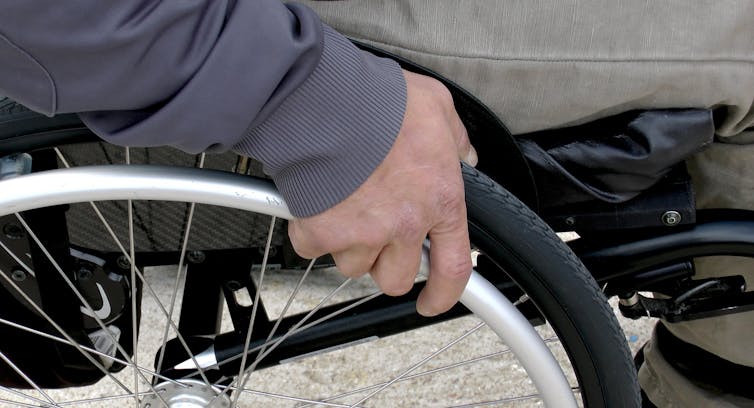
David Pettinicchio, University of Toronto and Michelle Maroto, University of Alberta
As Canadians, we like to think we’ve done a far better job responding to COVID-19 than other places, including our neighbour to the south.
Our relative success lies in swift responses to and consistent messaging about the pandemic in non-partisan ways. Nationwide physical distancing measures were done in consultation with public health officials, resulting in a national shutdown beginning in March 2020. Our understanding and approach to the pandemic has also led to a relatively more cautious recovery.
Consistent economic support was also an important pillar of the federal government’s response to COVID-19. Canadian wage earners out of work or at reduced hours received a taxable monthly basic income of $2,000 per month (the Canada Emergency Response Benefit known as the CERB), helping many Canadians face the resulting economic tumult.
Read more: How to build a better Canada after COVID-19: Transform CERB into a basic annual income program
But many groups have been left out of government policies and programs and are struggling.
At the University of Toronto and University of Alberta, we conducted a nationwide survey, to be published at a later date, that revealed Canadians with disabilities and chronic health conditions are very worried about getting COVID-19.
Respondents also said they feel like their voices aren’t being heard by policy-makers. They’re concerned about their long-term economic situation.
Do not qualify for the CERB
Many people with disabilities and health conditions who qualify for disability benefits do not qualify for the more generous COVID-19 benefits, like the CERB, even though the pandemic has imposed on them additional financial strains.
One immunocompromised respondent with multiple health conditions including diabetes, hypertension and obesity noted that they already live on $400 less than those getting CERB.
“They complain at how ‘little’ they are getting, all while telling us disabled that we should be grateful that we get as much as we do. Sorry, but how are we expected to permanently survive on this while they can’t survive even a few months on their savings and hundreds more than we get? Knowing that costs are going up, yet income is not going to for at least another four years is terrifying. I’m unable to work any time in the near future, so I am falling further and further behind with each passing day.”
A lack of additional disability supports has meant that vulnerable groups have had to look to other means for supporting themselves through the pandemic.

We found that about 40 per cent of our respondents have added to their credit card debt since the start of the pandemic, and almost half say that the pandemic is negatively affecting their ability to pay their debts.
Over a third of our respondents say they are struggling to pay their rent, mortgage and utility bills because of COVID-19. Sadly, over half our sample say they are struggling to pay for groceries.
Incurring extra costs
An individual with a physical disability and who is also immunocompromised noted:
“There has been no additional financial support, but like everyone else, we are incurring extra costs for essentials as we need things delivered or help with everyday shopping and chores.”
The pandemic is also limiting respondents’ abilities to prepare for future financial emergencies. Almost two-thirds of respondents say they are struggling to save money during the pandemic. Instead, many are having to dip into their savings to make ends meet.
A homemaker with chronic health problems told us she used $15,000 from her savings just to get by. With her husband unable to find work, she says:
“We just get further and further behind and there is no additional help. I get none.… What am I supposed to do? I feel very left out. I’m very depressed and feel like there is no hope. Every day when you think it can’t get any worse something worse comes up.”
Even with comparatively better conceived and consistent policies in Canada, and relatively more generous social and economic supports to counter the negative effects of COVID-19, vulnerable people are still being left out.
Too little, too late?
Over a million Canadians have a Disability Tax Credit certificate (DTC) and a significant majority of those are for an indeterminate duration. Only recently, Carla Qualtrough, Canada’s employment minister, proposed a onetime $600 payment to people with disabilities holding a valid DTC certificate.
That may be too little, too late. It certainly won’t be enough to mitigate the economic devastation the pandemic leaves behind.
People with disabilities in this country already experience low employment and low earnings, living paycheque to paycheque. They are also more likely to live in poverty.
Added setbacks during the pandemic could prove insurmountable as we enter into some sort of recovery, running the risk of further marginalizing people with disabilities and health conditions.
David Pettinicchio, Associate Professor, Sociology, University of Toronto and Michelle Maroto, Associate Professor of Sociology, University of Alberta
This article is republished from The Conversation under a Creative Commons license. Read the original article.
US Death Toll Soars As Global Virus Cases Top 19 Million
Monday, 10 August 2020 13:00 Written by AFPDaily coronavirus deaths in the US surged to a three-month high of over 2,000 on Thursday and the number of cases passed 19 million globally, pushing many nations to further ratchet up restrictions in the battle against the pandemic.
The world’s hardest-hit country, the United States, has seen a major coronavirus resurgence since the end of June, adding 2,060 deaths in 24 hours alone Thursday, a tracker by Johns Hopkins University showed.
But other corners of the globe were also marking grim milestones, with Mexico’s official toll soaring above 50,000 dead and the continent of Africa hitting one million confirmed cases.
More than half of Africa’s infections are in South Africa, which has the fifth highest number of infections in the world, after the US, Brazil, India and Russia.
Nevertheless the African continent remains one of the least affected, according to the official figures, with only Oceania registering fewer COVID-19 cases.
At least 19,000,553 cases and 712,315 deaths have been registered worldwide, figures compiled by AFP from official sources at 2300 GMT showed, driven by surges in Latin America and India.
The United States has recorded the most deaths with almost 160,000, followed by Brazil with nearly 100,000. Globally, 40 percent of all cases have been notched in the two countries.
Europe remains the hardest-hit region worldwide with more than 200,000 fatalities since the virus first emerged in China late last year.
As governments across the globe struggle to salvage economies ravaged by months of lockdown, many have been forced to look at new measures to curb outbreaks of COVID-19 since they lifted initial containment orders.
Such is the case in Europe where nations imposed new travel restrictions and containment measures with fears growing over a second wave of infections.
In Australia, the second-largest city Melbourne entered the country’s toughest lockdown yet on Thursday, closing non-essential businesses and requiring hundreds of thousands more people to stay home.
– Travel restrictions –
Germany is the latest to introduce mandatory tests for travelers returning from designated risk zones, starting on Saturday, as fears grow over rising case numbers blamed on summer holidays and local outbreaks.
Germany’s list of “risk zones” currently includes most non-EU countries, as well as certain provinces in Belgium and Spain.
Neighboring Austria on Thursday announced it would issue a travel warning for mainland Spain, becoming the latest country to do so amid a rise in new coronavirus cases in the fellow EU member.
Finland also introduced new controls on arrivals from some EU countries, including Belgium, the Netherlands and Andorra, putting a stop to tourists arriving from there and imposing a 14-day quarantine on other returnees.
“The situation is extremely delicate,” the health ministry’s strategic director Liisa-Maria Voipio-Pulkki said, adding that “some sort of second stage has begun.”
Britain has reimposed quarantine for travelers from Belgium, Andorra and the Bahamas.
Norway announced Thursday that France would be considered a red zone due to the resurgence of coronavirus cases there, meaning all travellers arriving from France face a mandatory ten-day quarantine.
Switzerland, Monaco and the Czech Republic were also hit with similar restrictions, as well as two Swedish regions, the Norwegian foreign affairs ministry said.
“The infectious situation can change quickly, as can the restrictions,” Foreign Minister Ine Eriksen Soreide said.
The United States bucked the trend despite its own soaring death toll, lifting a blanket warning against all foreign travel.
“Health and safety conditions (are) improving in some countries and potentially deteriorating in others,” the State Department said in a statement.
– Business struggles –
Many nations are seeing new outbreaks, forcing local or citywide lockdowns and other quarantine measures.
Poland will re-impose compulsory face masks in all public spaces in nine districts amid a new high in infections.
The restrictions will come into force from Saturday and will also affect sports and cultural events in those areas, mainly in the south and east.
Greece’s government on Wednesday announced a “wake-up week” on COVID-19, tightening restrictions after the steady rise in mostly domestic infections.
Officials have blamed the increase on overcrowding in clubs and social events.
The new virus outbreaks are forcing officials into an uncomfortable trade-off between public health and the need to bring economies back to life.
German airline Lufthansa on Thursday became the latest to reveal the fallout from the pandemic, announcing forced layoffs and a 1.5 billion euro ($1.7 billion) loss in the second quarter, the worst in its history.
AFP
How to build a better Canada after COVID-19: The power of everyday actions can bring about change
Sunday, 09 August 2020 00:24 Written by theconversation 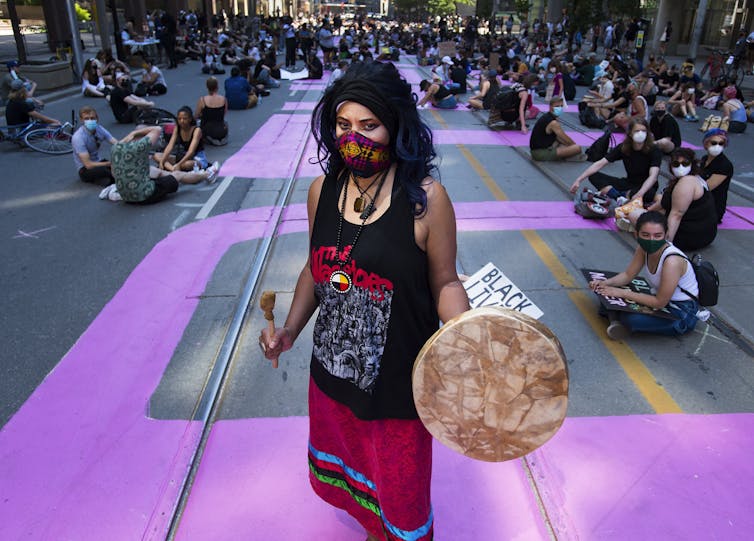
Jocelyn Thorpe, University of Manitoba
This story is part of a series that proposes solutions to the many issues exposed during the coronavirus pandemic and what government and citizens can do to make Canada a better place.
I teach in gender studies, where I spend time with university students discussing critical issues that shape our society — power, violence, racism and colonialism. My students learn that histories are complicated and alive in the present.
Yet at a recent Black Lives Matter march in Winnipeg, I was struck by two simple messages: one protestor wore a T-shirt that read “Be kind” and another walked by with a sign saying: “Get your knee off our necks.”
The message to “be kind” seemed to gesture to another world, a world in which one white knee could not possibly have the power to end one Black life. The second message drove home the fact that we live nowhere close to such a world.
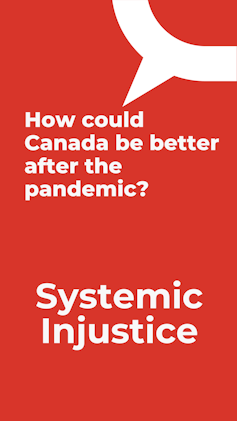
Instead, we live in a world where “normal” means systemic injustice that has become only more intense and apparent during COVID–19.
We live in a world where white women like me don’t have to teach our white kids to keep our hands on the wheel if stopped by police. We don’t have to tell them never to talk back, always to agree, always to do exactly as they are told. We can say to them that they need to treat others with kindness and respect — and that they deserve and can expect the same in return.
Make use of power
Canada could be better in a post-COVID-19 world if all of us recognize and make use of the power of our everyday actions toward social justice. We cannot be comfortable in a world where some of us are afforded kindness and respect, taught to expect it, and others are not.
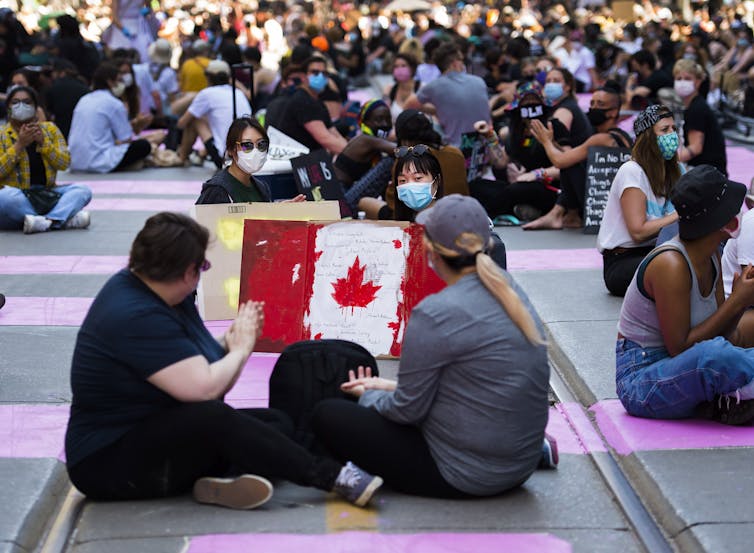
During the pandemic, we have seen our ability to act in alignment with public health measures. As a result, we have all contributed to the success of reducing the spread and severity of this virus. But unlike COVID-19, injustice does not spread by accident. Injustice is about power: who has access to it and who does not.
The norm of present-day inequities stems from a history of colonialism in which white men with access to power built systems that benefited them at the expense of others.
Whether we look historically at the Canadian government starvation policy that helped to clear the Prairies of Indigenous people to make room for white settlers, the 200 years of slavery in Canada or the legal enforcement of women’s subordinate status, we find a common theme: only propertied white men counted as fully human, and therefore they were the only ones who received rights, recognition and respect.
Altering the status quo
Although such an idea is counter to the equality touted in the Canadian Charter of Rights and Freedoms, we witness its continued effects in multiple forms — for example, in the climate of anti-Black racism and ongoing violence against Indigenous women, girls and two-spirit people. Yet we also see a groundswell of support for Black Lives Matter in the wake of the killing of George Floyd. In large enough numbers, people with access to less power can alter the status quo.
It is crucial to name a problem — in this case, systemic injustice — in order to make it visible. The naming is important because it allows us to understand that the violence follows a pattern. But naming alone does not make change happen. Action does.
Calls for “systemic change” seem big and complicated, like the histories that brought us to this moment. But the systems that need changing do not exist in some separate realm. They are made up of people who make decisions every day, decisions about how to act and about who matters.
Similarly, people’s experiences of unjust structures are not structural. They are personal, the result of the actions of others — actions rooted in the belief that some people matter more than others. Actions could equally be rooted in another belief: the belief that everyone is equally human. No one is an object and so no one should be objectified.
Everyone is equally human
We do need systemic change. We cannot accept a status quo of racialized and gendered violence. We are not equally implicated in the structures that operate unjustly, but we all do interact daily with other people (even if those interactions take place at a physical distance these days). Those interactions give us the opportunity to act in line with the belief that everyone is equally human, and equally entitled to the rights, recognition and respect historically granted only to the few.
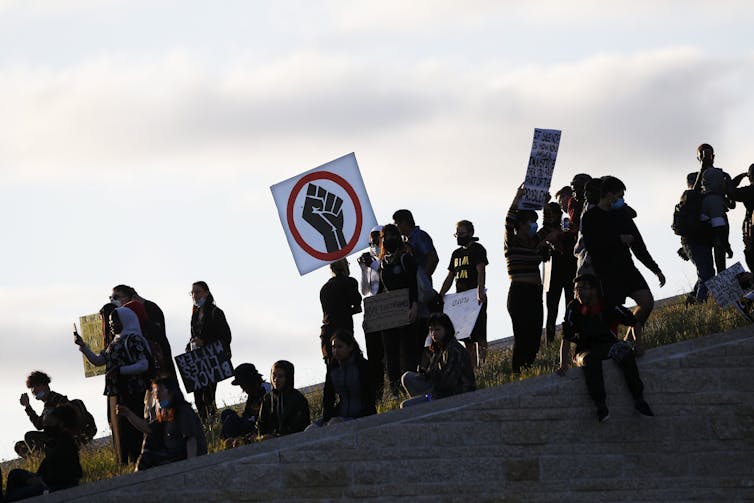
It has taken centuries to build up unjust structures. They will not disappear quickly. Yet it is also true that unjust structures require unjust beliefs to hold them up. Taking apart the structures goes hand in hand with challenging the beliefs.
Millions of protesters have stood up against the institutionalized belief that Black lives do not matter. Black Lives Matter. It is incumbent upon all of us, particularly those with access to power, to act in alignment with a status quo of justice and respect.
“Be kind.” It’s true that it is a simple imperative. It might be a good place to start.
Be kind. Learn our collective history. Act in kind and respectful ways, every day. End the violence.![]()
Jocelyn Thorpe, Associate Professsor, Women's and Gender Studies, History, University of Manitoba
This article is republished from The Conversation under a Creative Commons license. Read the original article.
Popular News
How we mourn the victims of tragedies depends on their citizenship status
Friday, 07 August 2020 14:16 Written by theconversation 
Raluca Bejan, Dalhousie University
Some migrants are welcomed into the nation while others are not. The pandemic throws into sharp relief who is considered worthy and who is not in Canada.
This differentiation was also made clear by the Ukraine International Airlines Flight PS752 incident. On Jan. 8, 2020, Flight PS752 crashed shortly after taking off in Iran, killing everyone on board. The tragedy highlighted how some migrants are welcomed into Canada while others are not.
Unskilled migrants often arrive as temporary foreign workers or undocumented individuals. They are viewed by Canadian immigration policy as good enough to work yet not good enough to stay. They enter on limited work contracts and are barred from qualifying for permanent residency status. In effect, their entry is premised on their expected departure and future exclusion.
On the other hand, skilled migrants — like engineers, academics and business executives — are selectively recruited into Canada on the basis of their skills through a points system, where credentials, language proficiency and age are highly valued. Young, educated and English- or French-speaking migrants are most desired.
Professional gains and losses
Labelled the “best and the brightest,” skilled immigrants are considered well-equipped to fully participate in Canadian society, contribute to the Canadian economy and strengthen the Canadian national fabric. Their presence is celebrated and their loss is mourned.
Of the Iranian Canadian passengers on board Flight PS752, most were skilled professionals: academics, scientists, doctoral students and medical trainees. The public outcry around the deaths focused on the loss of these professionals for Canada.
In other words, it is the Canadian state’s losses that were mourned. The national frame of reference was stretched to include future contributors to Canadian national development.
Iranians were not woven into the Canadian national fabric prior to this tragic event. A 2017 survey conducted by the Iranian-Canadian Congress found that up to 65 per cent of Iranian Canadians have faced racism and discrimination in workplace environments, social settings and at border crossings. As skilled professionals, however, the loss of their potential contributions to Canada was given due consideration in the wake of the Flight PS752 crash.
Unequal grief and mourning
Although foreigners can become citizens, they are rarely seen — symbolically speaking — as equal to those born in Canada.
For example, the public fundraising campaigns for the victims of Flight PS752 struggled to raise money when compared to the 2018 campaign for the Humboldt Broncos hockey players. While the Canada Strong Campaign managed to exceed its $1.5 million funding goal, smaller-scale, local efforts organized mainly to cover funeral and memorial costs, received low support.
One effort started by community member Shayesteh Majdina in Edmonton raised $68,794 — a $20,000 donation from the family that owns West Edmonton Mall represented 40 per cent of the entire amount. A similar crowdfunding push in Vancouver has not raised any funds.
By contrast, a campaign for 15 Humboldt Broncos hockey players killed in the 2018 bus crash raised over $15 million. This was one of the biggest ever fundraising campaigns hosted on the GoFundMe platform, second only to the MeToo initiative that year.
Within 24 hours, the Humboldt Broncos fundraiser had raised $1 million; by the fourth day it reached $6 million, and within two weeks had reached $15.2 million. This is approximately 15 times more than the $885,602.94 that the Canada Strong Campaign managed to raise for the Iranian victims in over a month. Although an agreement from the federal government intended to match collected funds up to $1.5 million, the matching of state donations was set to end on February 21, 2020, at a time when the campaign sat at half of its funding goal.
These markedly different outpourings of grief reflect the different ways that immigrants are seen in relation to symbols of Canadian culture: the Humboldt Broncos represent a Canadian national symbol.
National subjects and national values
To attend a hockey game in Canada is to participate in a Canadian pastime, similar to celebrating Canada Day, skiing in the winter or shopping for clothes at Roots. Such social and cultural practices become markers of Canadian pride. Their ideological function is not only about maintaining national culture, but also about differentiating the outsiders from the insiders, the newcomers from the Canadians.
In the citizenship study guide “Discover Canada: The Rights and Responsibilities of Citizenship,” hockey is shown as the national winter sport. Anyone who has ever attended a hockey game can recognize its associations with national pride, from people standing up during the anthem to the public recognition of Canadian soldiers fighting in Iraq and Afghanistan.
Hockey provides a manifestation of the socio-cultural universality of Canadian identity. Several professional hockey teams, such as the Pittsburgh Penguins, Toronto Maple Leafs and Calgary Flames, as well as the Calgary Hitmen Hockey Club, donated to the Humboldt Broncos fundraising campaign. There is no public information easily available to indicate that these teams donated to the Canada Strong incentive in support of the Iranian plane crash victims.
Skilled immigrants might be potentially included in Canada, but their inclusion and their value as subjects within the nation depends on their contributions. They can never be the type of nationals that signify what Canada is all about. Despite being highly educated and producing an economic benefit to the country, skilled immigrants can never embody the true spirit of national pride.
We might grieve their economic loss to the country — as in the case of the victims of Flight PS752 — and yet we do not grieve for them in the same ways as those born into the ideological confines of the Canadian nation-state.
Raluca Bejan, Assistant Professor of Social Work, Dalhousie University
This article is republished from The Conversation under a Creative Commons license. Read the original article.
Nigerian Lady, Kaosiso Ezibe, cleared of Fraud in Canada
Wednesday, 05 August 2020 23:43 Written by newsexpressngr.A Nigerian lady, Kaosiso Ezibe, was on March 10, 2020 cleared of the fraud charges against her by the Ontario Court of Justice, Canada as all the charges were withdrawn.
She was arrested in Canada on July 24, 2019 by Toronto Police Service on six-count charges bordering on fraud, laundering proceeds of a crime and possessing the proceeds of a crime.
A certified copy of the court judgement obtained by our correspondent showed that all the charges were dropped as she the facts established that she was a victim of the fraud she was accused of.
In a telephone interview, Kaosiso Ezeibe expressed delight at the outcome of the matter, while appreciating God for vindicating her. She said she was shocked with her arrest, stating that she had never been involved in any kind of crime because of the good upbringing she received from her family. She said she prayed fervently to God to vindicate her for the sake of her family name.
“I cannot thank God enough for bringing the truth to limelight and vindicating me. From the day I was accused and arrested, I did not stop praying and believing God for victory. I have never been involved in crime and never will. The good upbringing I received from my family and the good reputation of my family are so dear to me that I cannot be involved in crime,” she said.
She thanked her parents who stood firmly by her and the investigators who ensured that the fraudsters were tracked and caught. She then urged Nigerian youths in diaspora to eschew all forms of evil, crime and violence while holding on to the true virtues of hard work, diligence and civility.
28-year-old woman becomes the first COVID-19 survivor to receive a double-lung transplant in the US
Tuesday, 04 August 2020 06:33 Written by OASESNEWSA 28 year old woman, known as Mayra Ramirez has become the very first Coronavirus survivor to receive a double lung transplant in the United States.
Ramirez, experiencing Coronavirus symptoms, arrived at the Northwestern Memorial Hospital's emergency room on April 26 and within minutes, her terrible experience with the disease began.
"All I remember was being put to sleep as I was being intubated and then six weeks of complete nightmares," she told CNN on Monday August 3, 2020.
"Some of the nightmares consisted a lot of drowning and I attribute that to not being able to breathe."
According to her, Covid-19 had irreversibly damaged her lungs and her other organs were beginning to fail.
Ramirez spent more than a month on a ventilator and doctors told her parents who flew from North Carolina to say a final goodbye to her as they were unsure if she would survive.
But doctors, gave a her a clinger of hope; A double-lung transplant was the only thing that could save her life.
"Without the transplant, she would not have made it," Dr. Ankit Bharat, the chief of Thoracic Surgery at Northwestern Medicine in Chicago said.
The fact that she was young and had no bad medical history, made her survival chances higher.
"I looked at myself and I couldn't recognize my own body," Ramirez said, after waking up in the hospital following her procedure.
"I couldn't talk, I could barely lift a finger, I couldn't move. I was in a lot of pain, I was very confused."
"This is not a hoax," she said. "This virus is real, it happened to me."mm
Two months since the surgery and Ramirez says she's still weak and struggling to breathe even as she rehabilitates at home.
Ramirez is now the first person in the US to have received a lung transplant while sick with Covid-19 according to the Northwestern Memorial Hospital.
About 4.6 million people in the US have been infected with Covid-19.
Stella Immanuel busted as a quack COVID-19 doctor
Saturday, 01 August 2020 11:26 Written by PM NEWSDr Stella Immanuel has been exposed as a fraud after claiming that the discredited hydroxychloroquine drug is a tested cure for COVID-19.
Immanuel and a group of Trump frontline doctors went to Washington D.C. where Immanuel gave an impassioned speech testifying that the drug is efficacious.
She claimed she had treated 350 patients in her clinic and called all doubters scientific fraud.
But that is what she is being called, as a torrent of reactions followed her testimony.
One commenter wondered how she became a COVID-19 doctor when she is licensed to be a paediatrician.
In one of the reactions to her video statement, she was linked to a fraudulent multi-level marketing VoIP phone scam 5 linx in 2008. She claimed then to be a millionaire in her promotion of the scam. The owners of 5 linx were indicted and sent to prison.
Meanwhile, Facebook has blocked her account and Youtube has also blocked the video as it violates its rules.
Facebook blocked her for conveying misleading information about COVID-19 cure. In response, Immanuel said: “Hello Facebook put back my profile page and videos up or your computers with start crashing till you do. You are not bigger that God. I promise you. If my page is not back up face book will be down in Jesus name.”

Stella Immanuel speaks in Washington D.C.
Here are samples of Twitter reactions to Immanuel:
But Stella Immanuel also has her supporters too, such as President Trump. Read their tweets:





